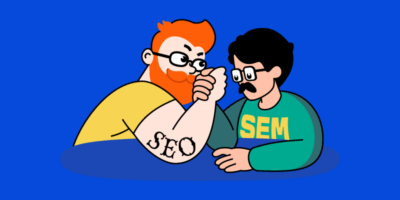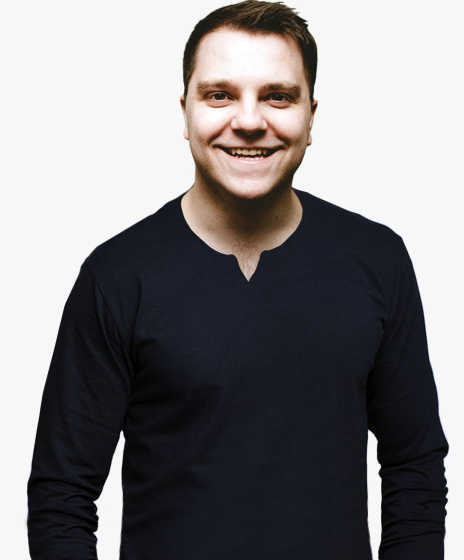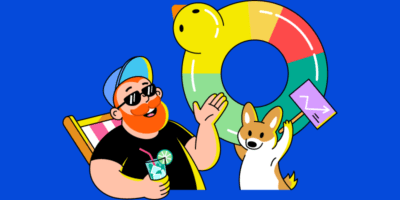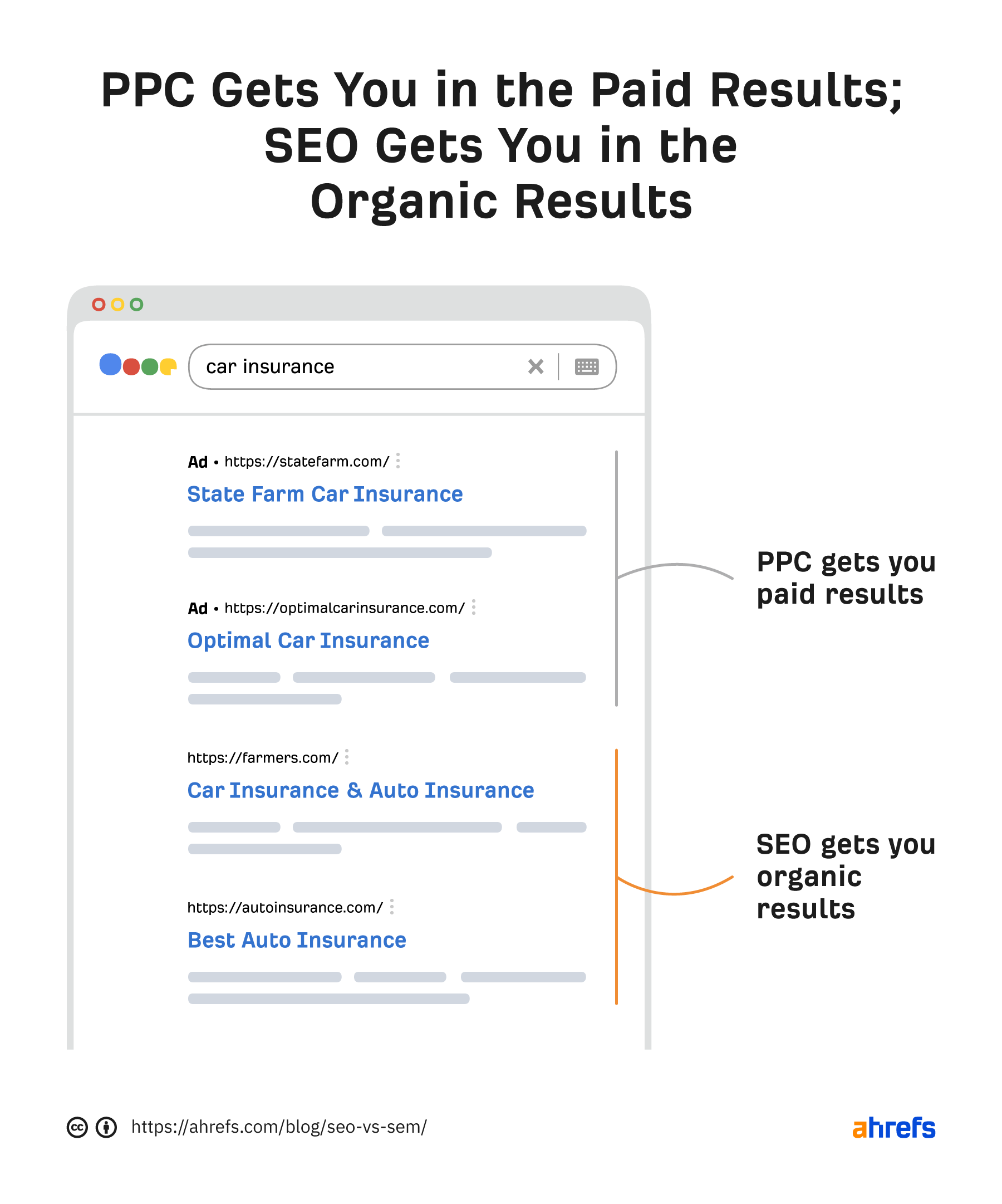
Both SEO and PPC are ways to market your business in search engines. So both are types of search engine marketing (SEM).
In this guide, you’ll learn how to create a winning SEM strategy to drive more traffic to your site.
But first, let’s make sure we understand the basics.
Search engine optimization (SEO) is the process of trying to rank in a search engine’s organic results. It involves four main steps:
- Keyword research – Find what people are searching for
- On-page SEO – Craft content for searchers
- Off-page SEO – Build trust and authority from other websites
- Technical SEO – Ensure search engines can find, crawl and index your content
Keyword research
Keyword research is about understanding the words and phrases your customers type into search engines. You can do this with keyword research tools like Ahrefs’ Keywords Explorer.
For example, there are 1.5K searches per month in the U.S. for “seo vs sem”:
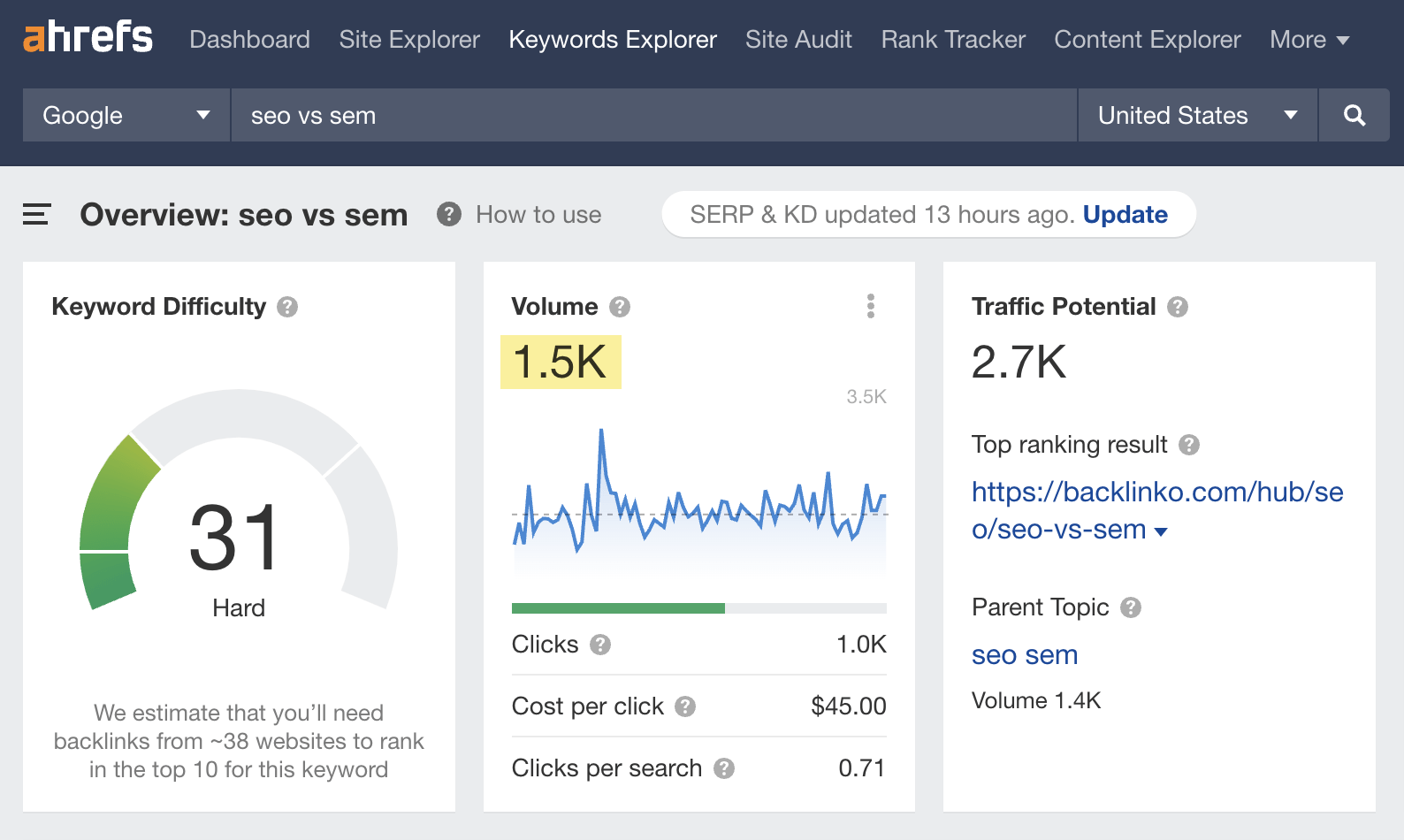
Ranking for this keyword would likely send a lot of traffic your way.
Learn more: Keyword Research: The Beginner’s Guide
On-page SEO
On-page SEO is about crafting the kind of content that searchers want to see. How you do this depends on the keyword you’re targeting.
For example, people searching for “seo vs sem” want to learn. They want an article explaining key differences. You can tell from the organic search results.
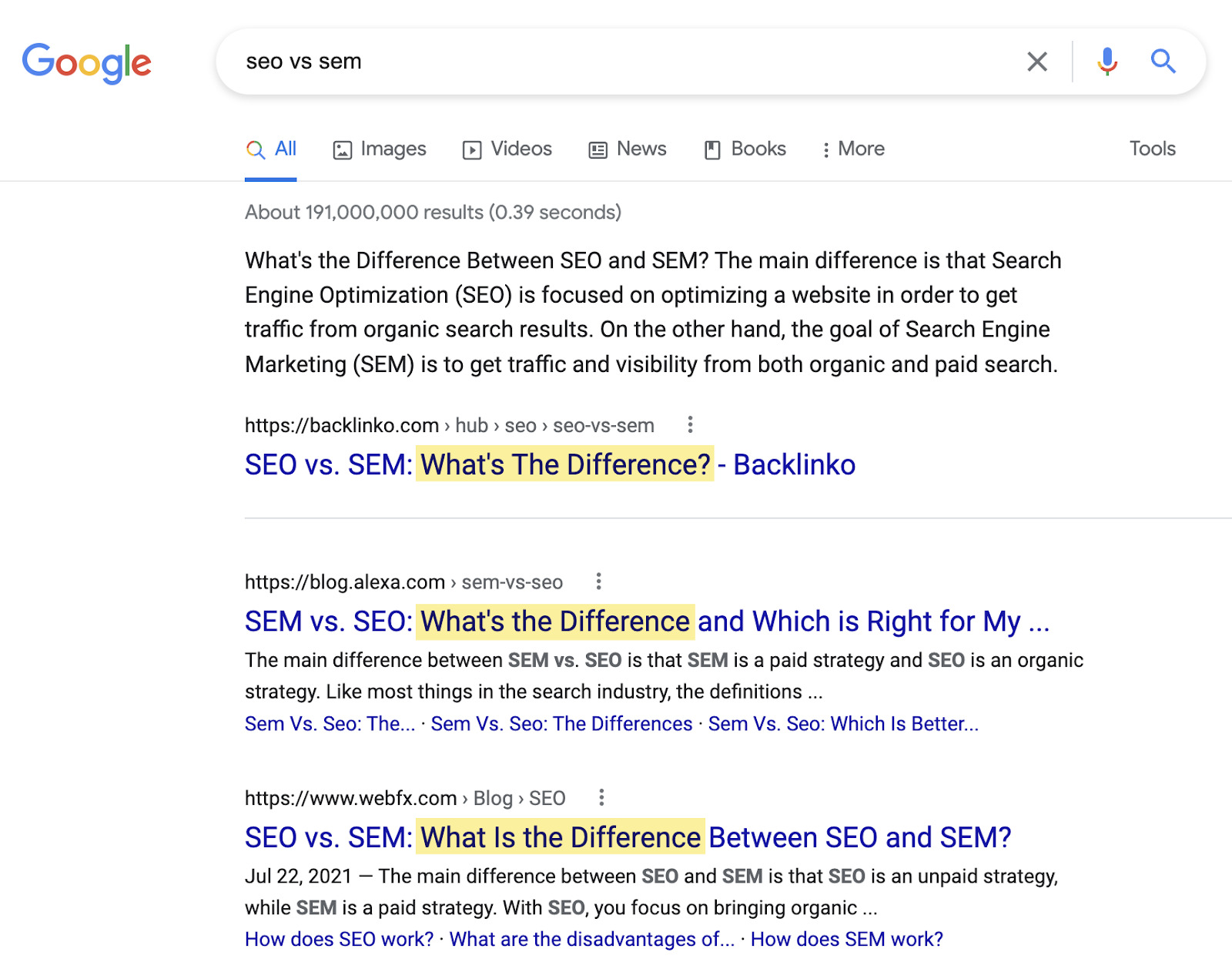
People searching for “baby clothes” want to shop. They want e-commerce results.
Again, we can tell from the organic results:
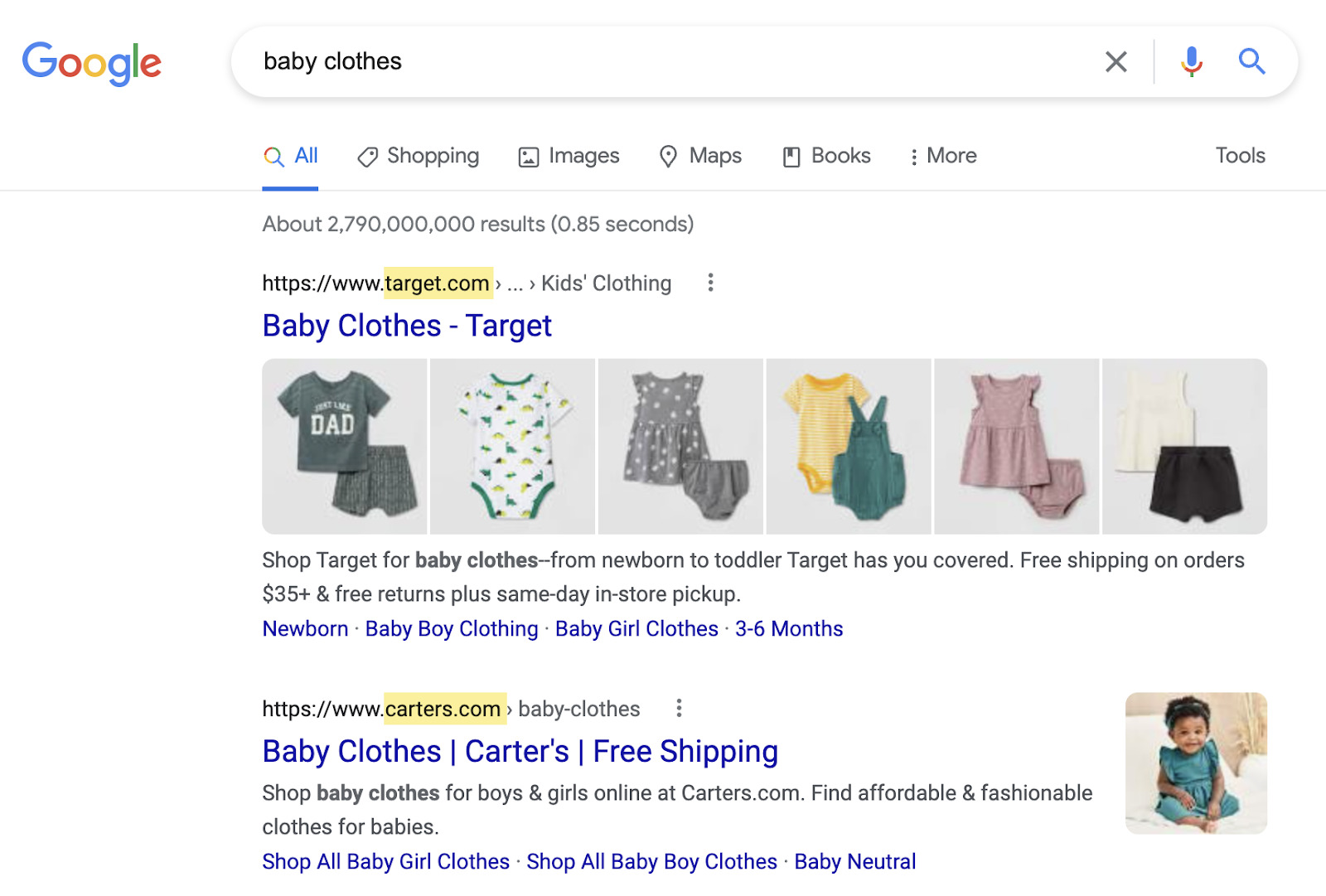
Giving searchers what they want is known as aligning your content with search intent.
But search intent isn’t the only thing that matters for on-page SEO. Other important factors include these:
- Strategically placing keywords
- Crafting a compelling title
- Using descriptive URLs
- Optimizing images
Learn more: On-Page SEO: The Beginner’s Guide
Off-page SEO
Off-page SEO is where you do things outside your site to show Google that your pages deserve to rank.
Building high-quality backlinks is the most effective off-page SEO task because backlinks are one of Google’s top three ranking factors. They act like votes from other websites.
For example, let’s say this article gets backlinks from other popular websites about SEO. This shows Google that others in the industry are vouching for our content, which may indicate that it deserves to rank.
You can see who’s linking to any page in the Backlinks report in Ahrefs’ Site Explorer.
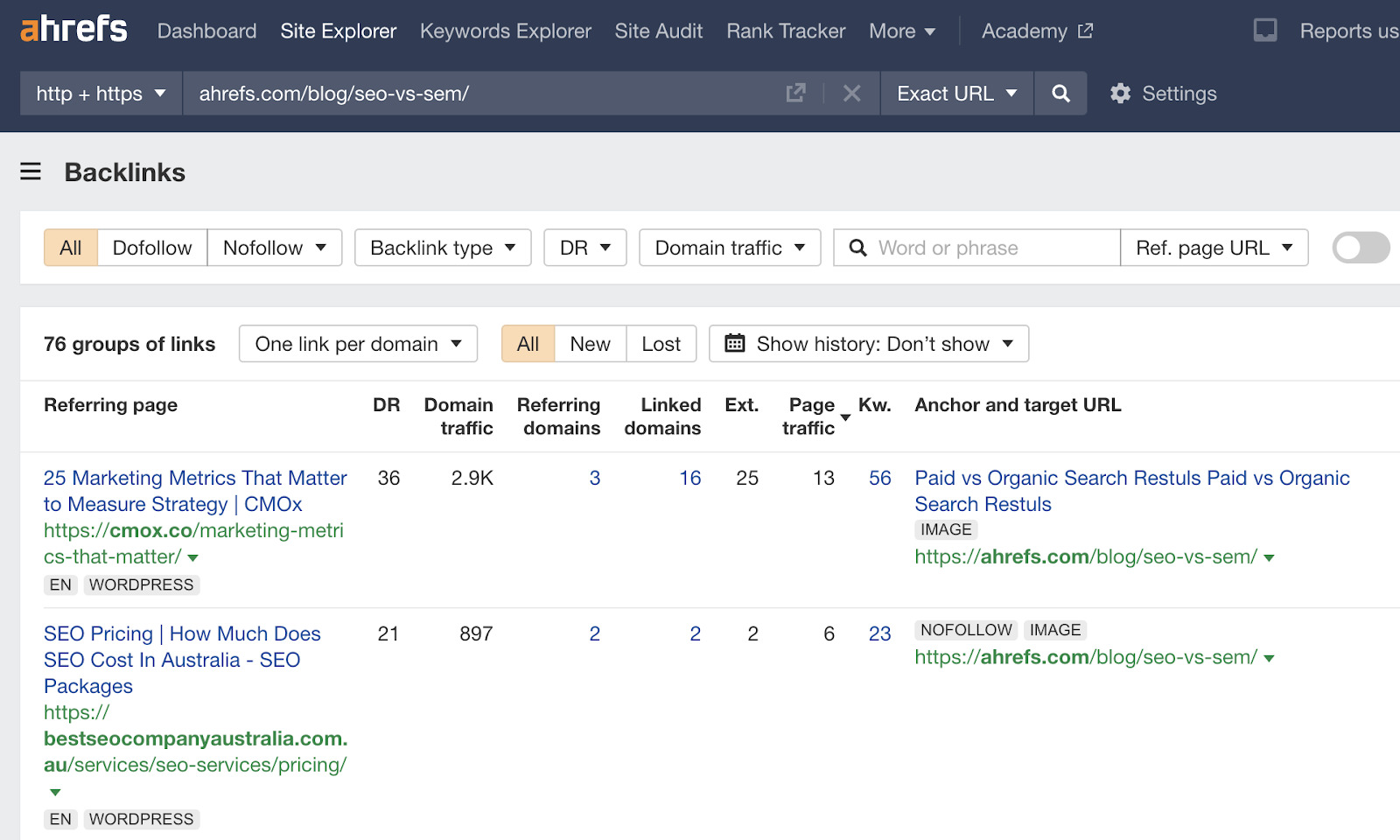
Links aren’t the only important off-page factor. Things like reviews may also play a role.
Learn more: Off-Page SEO: What It Is and Why It’s Important
Technical SEO
Technical SEO is all about making sure search engines can find, crawl, and index your content. You’re unlikely to rank unless search engines can do all three of these things.
Here’s a flowchart to explain:
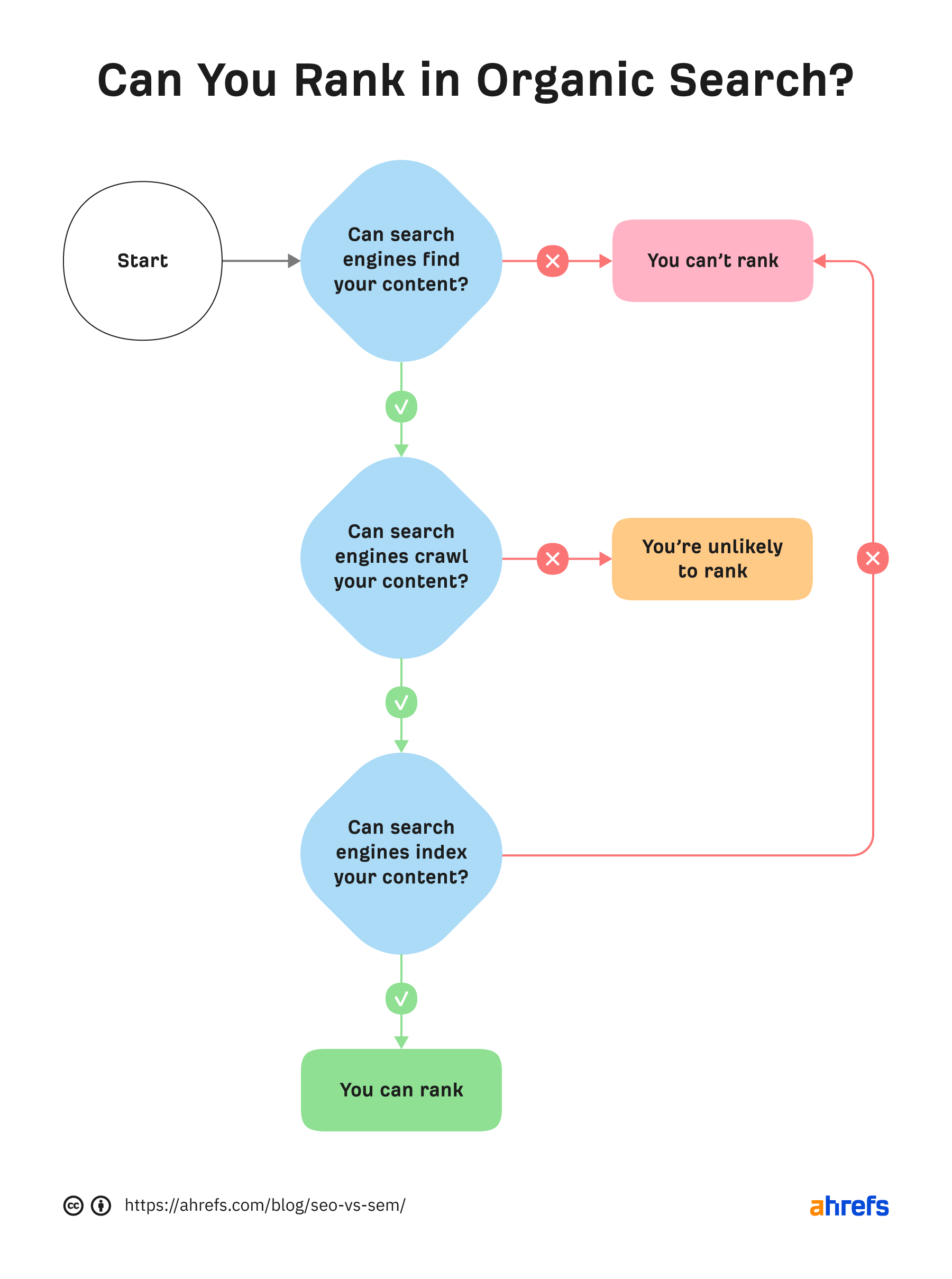
For example, let’s say we blocked search engines from crawling this article. This would stop them from seeing what’s on the page and make it harder for them to understand what it should rank for. As a result, it probably wouldn’t rank for anything.
Learn more: Technical SEO: The Beginner’s Guide
PPC (pay-per-click) is a form of advertising where you pay for website clicks from popular platforms. In the case of SEM, from search engines like Google.
For example, clicking this ad in Google costs Apple money:

Here’s what PPC advertising in Google involves:
- Keyword research – Find what your customers are searching for
- Bid setting – Decide how much you want to pay for a click
- Ad creation – Create a compelling and relevant ad
- Audience targeting – Choose who should see your ad
Keyword research
Keyword research for Google Ads is not only about finding what customers are searching for. It’s also about researching how much ads are likely to cost, which varies by keyword.
For example, the average cost per click (CPC) for “baby clothes” is more than double that of “cute baby girl clothes”:

Bid setting
Bid setting is where you decide how much you’re willing to pay Google for an ad click. If competitors outbid you and have equally (or more) relevant ads, Google won’t show your ad much and you won’t get many clicks.
Ad creation
Ad creation is where you decide what your ad will say and where it will send people.
For example, this ad takes searchers to our Site Audit landing page:
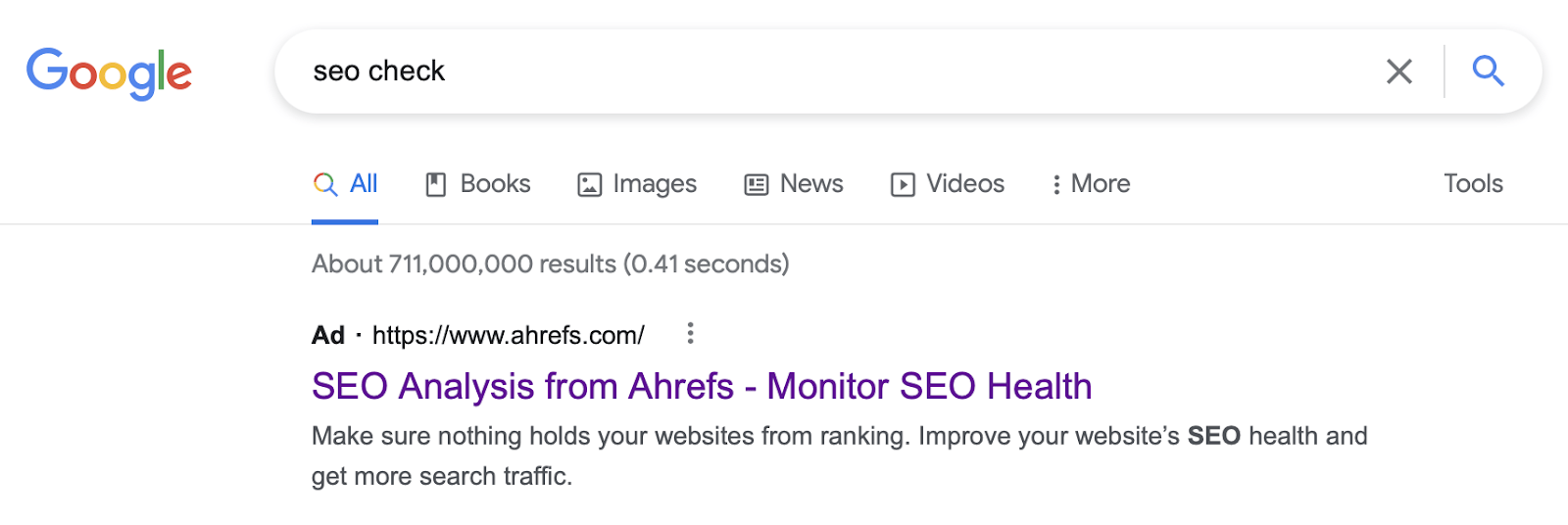
Google gives your ad a Quality Score, which tells you how relevant and useful your ad is.
On the whole, ads with high Quality Scores are seen by more people, and they pay less for clicks. Here’s some advice on improving your Quality Score from Google.
Audience targeting
Audience targeting is where you decide who should see your ad. You can target people based on who they are, what they’re interested in, where they are, and much more. Here’s more information about audience targeting from Google.
Search engine marketing (SEM) is where you drive traffic to your site from search engines. You can drive this traffic from organic or paid results, or both. You use SEO to get traffic from organic results and pay-per-click (PPC) to get traffic from paid results.
In other words:
Both SEO and PPC are types of SEM.
SEM can be fast or slow. It depends on whether you’re using SEO or PPC.
PPC is instant. Google will start showing your ad to searchers right away, so you can start driving traffic in minutes.
SEO is slower. Much slower.
In fact, our study of 2 million keywords found that only 22% of pages in the top 10 were published within a year.
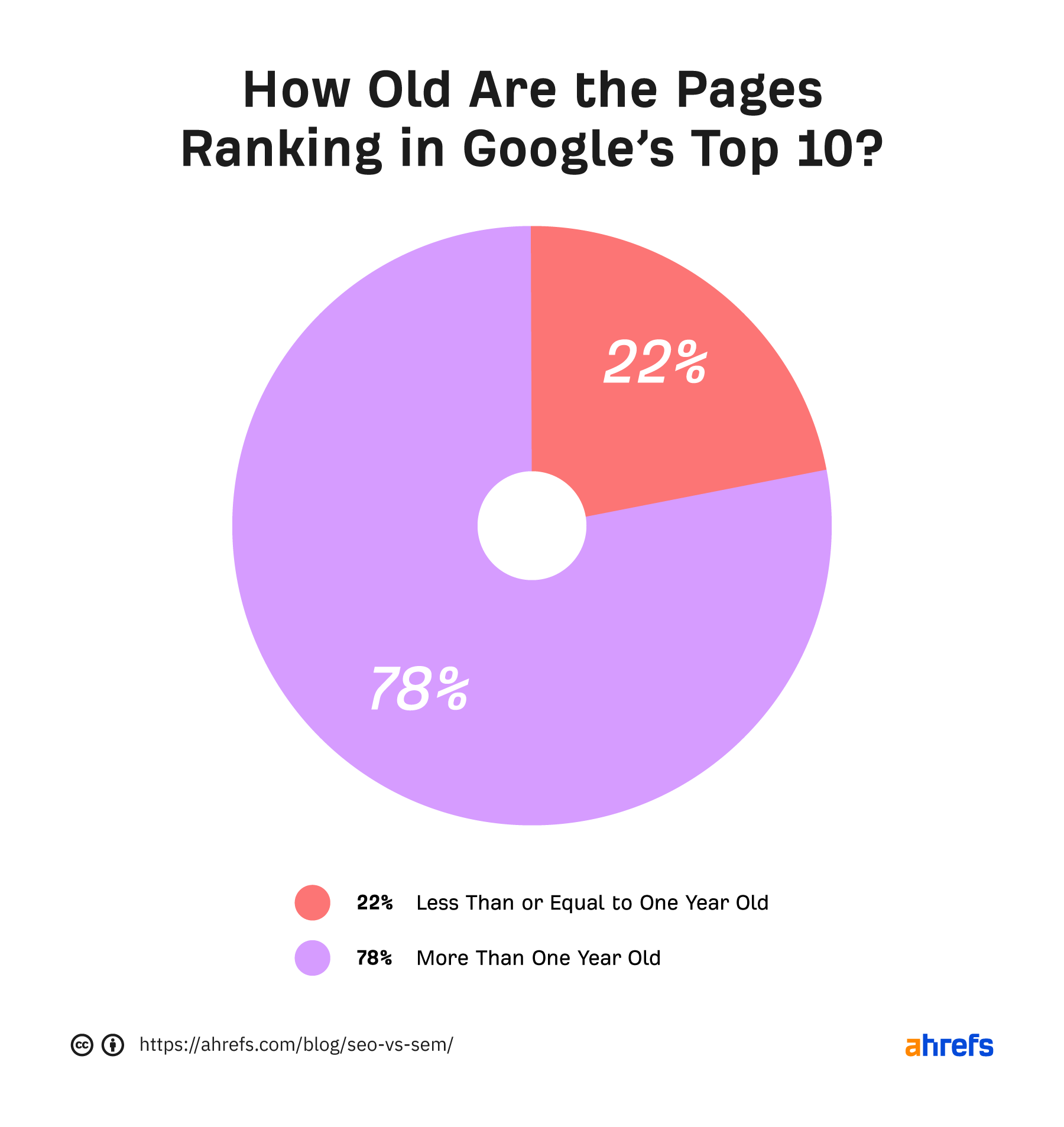
This doesn’t mean that you can’t rank faster. Some pages in our study ranked in under 60 days.
According to our data, the lower a keyword’s search volume, the more likely this is to happen.
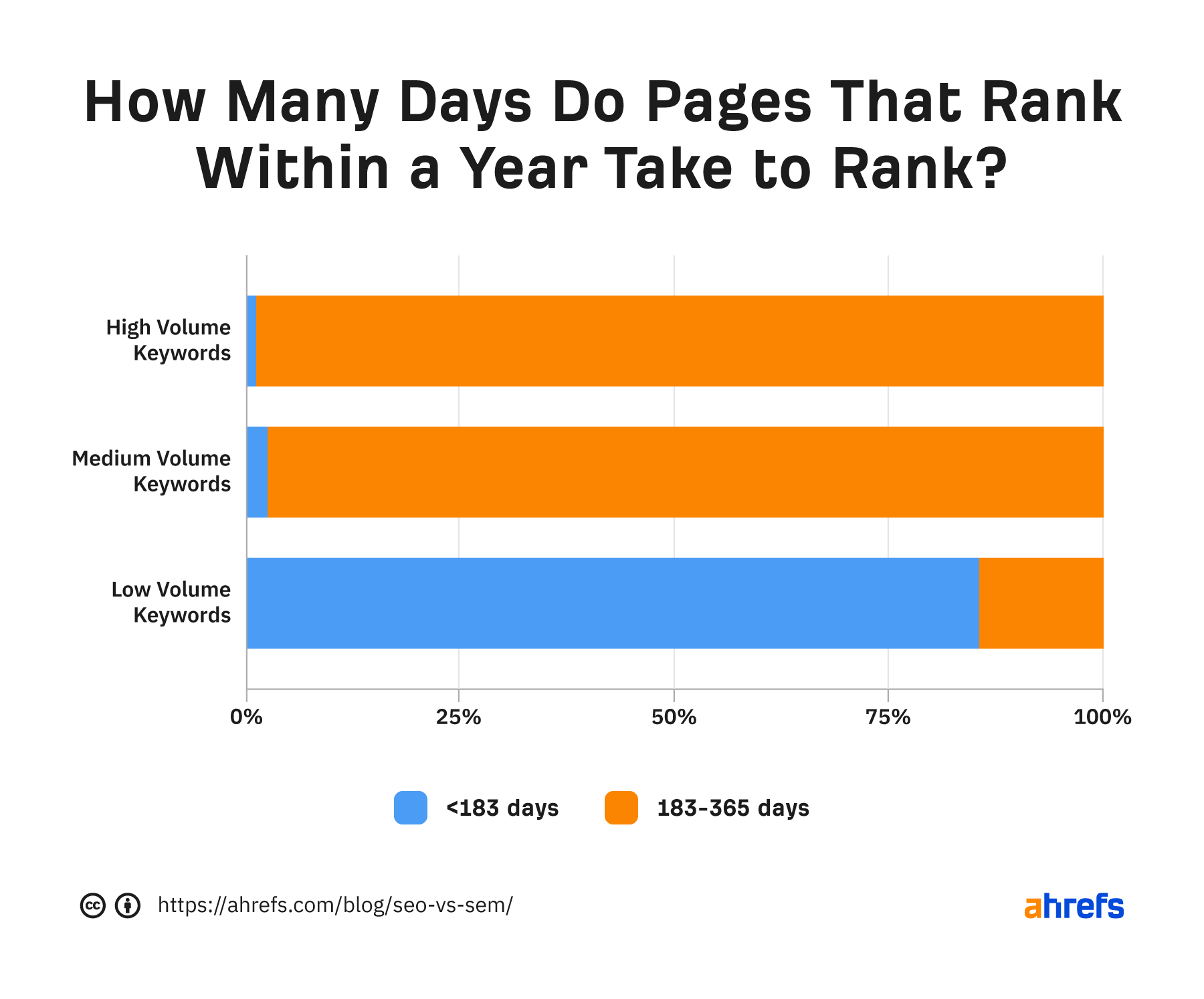
In other words: If you want the best chance of ranking fast, target low-volume keywords.
You can find low-volume keywords by filtering in Keywords Explorer:
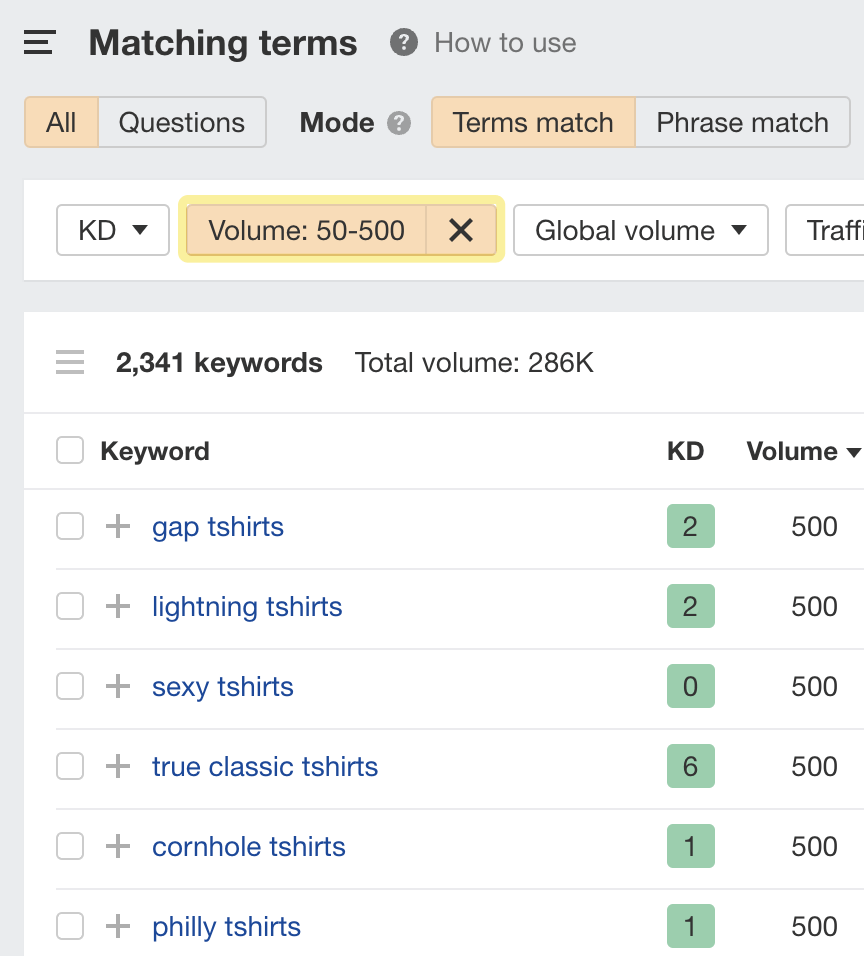
Learn more: How to Find Low-Competition Keywords for SEO
SEM isn’t free. There are costs associated with search engine marketing, whether you’re doing SEO or PPC.
If you’re doing PPC, each click costs you money. More clicks = more spend.
If you’re doing SEO, clicks are “free” once you rank. But ranking takes time and effort.
For example, our list of SEO statistics currently ranks #1 for “seo statistics.” And it’s consistently ranked in the top five for the past 12 months.
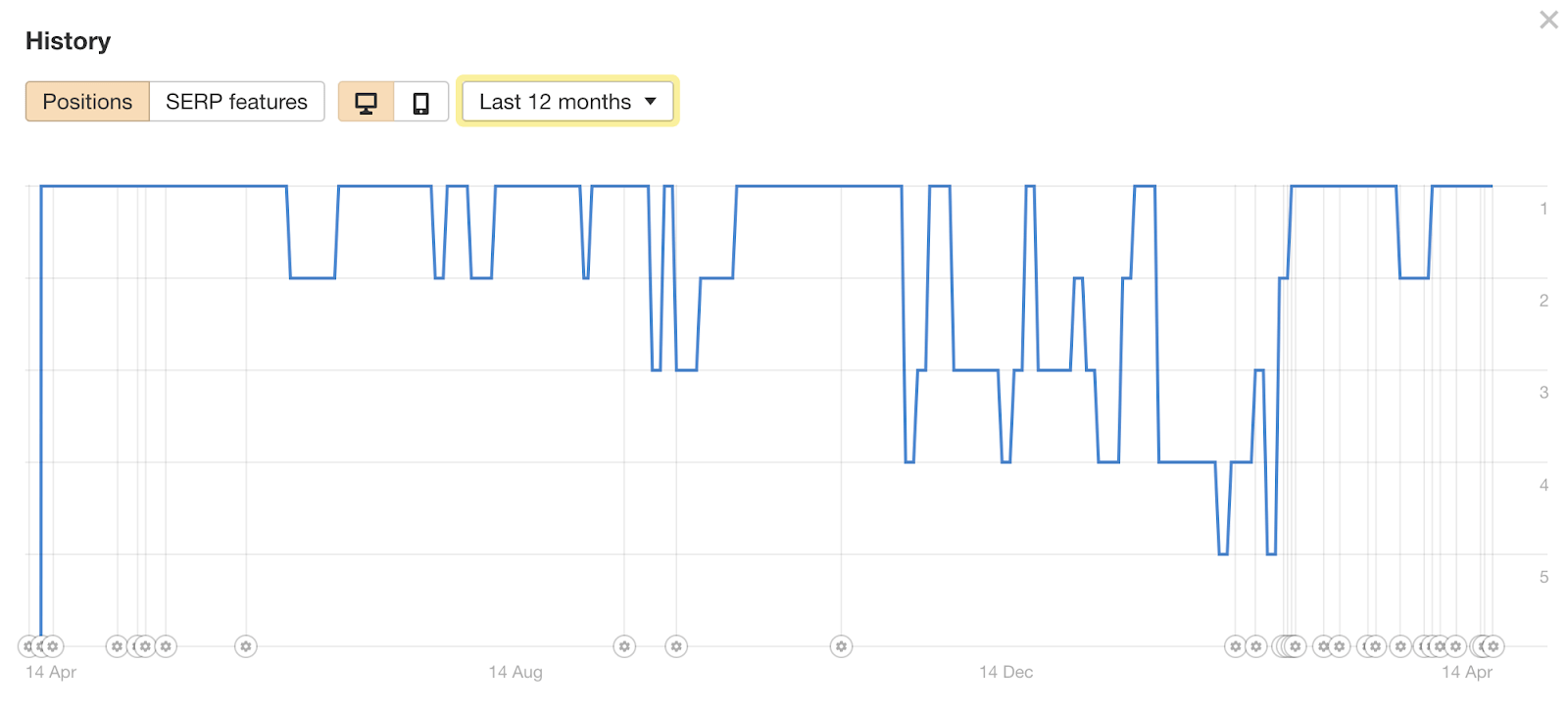
But this didn’t happen without effort. We spent a lot of time researching, creating, and building links to this page through email outreach.
I’d estimate that it cost thousands of dollars in man hours to get these results.
However, SEO is almost certainly cheaper than PPC in this case because the average CPC for “SEO statistics” in the U.S. is very high.
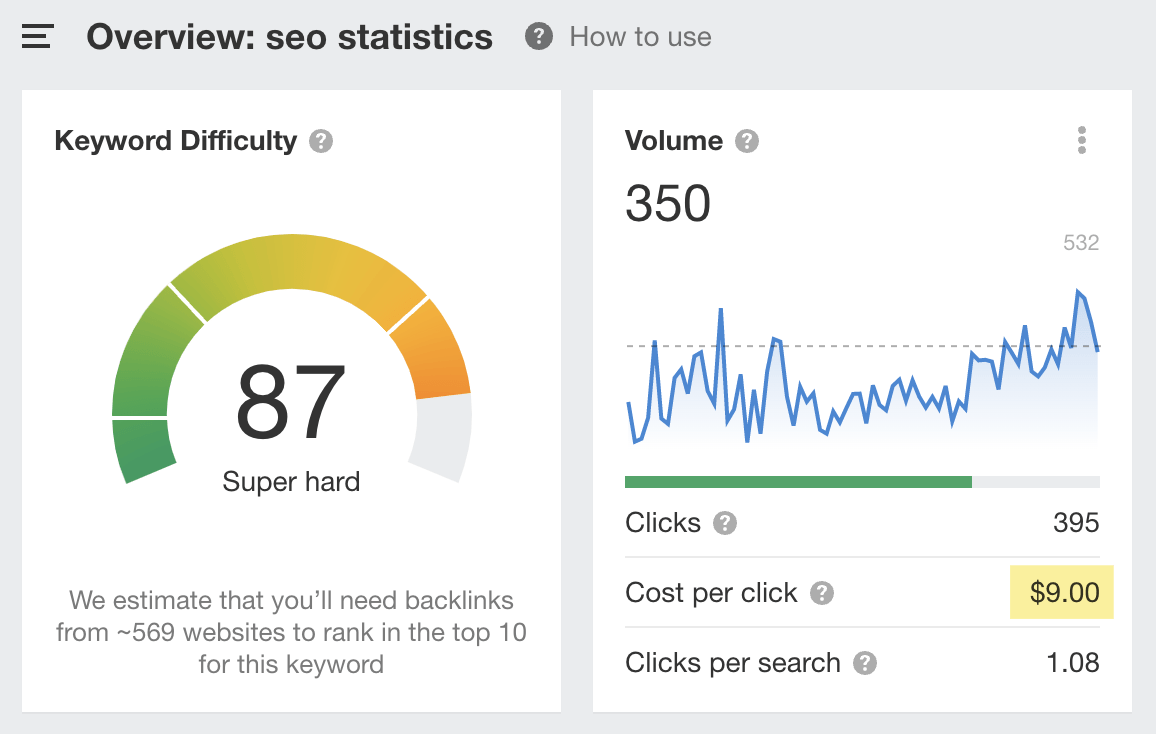
In fact, Ahrefs’ Site Explorer estimates that the organic search traffic we’re getting to this page would cost an estimated $1,500 per month in PPC ads.
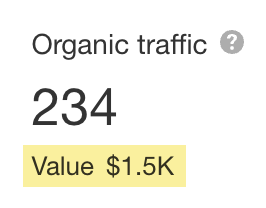
Given that this page has been getting roughly the same amount of organic traffic for 18+ months, this would have cost us ~$27,000 with PPC.
Plus, if our SEM strategy only consisted of PPC, traffic would drop to zero the second we stopped lining Google’s pockets. But with SEO, traffic remains steady—despite us not touching the page in months.
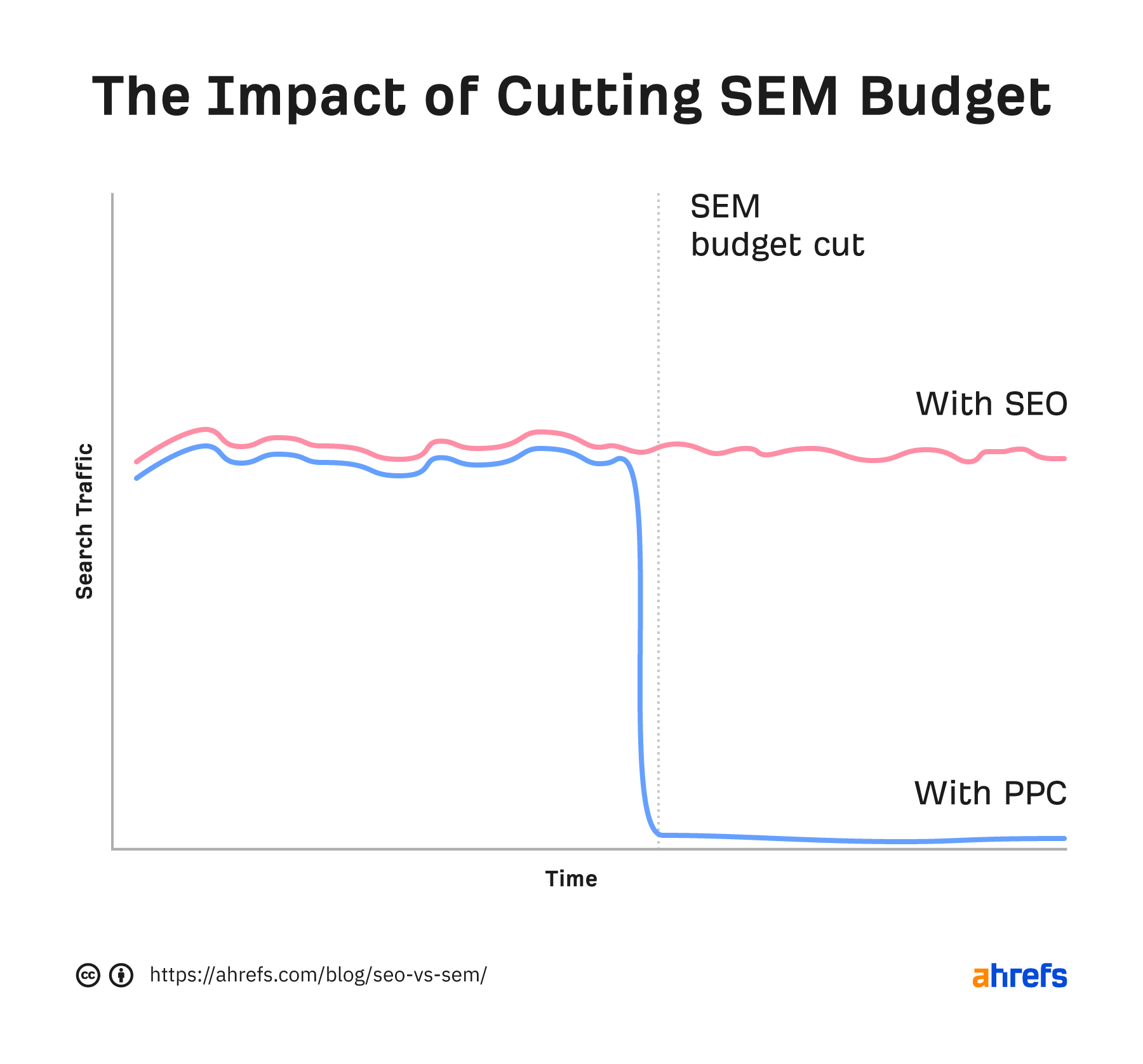
Knowing what we now know about SEM, it’s easy to jump to the conclusion that SEO is the way forward because organic traffic is “free” and passive.
This isn’t always the case. It depends on the keyword.
SEO sometimes works best. Other times, PPC works best. And sometimes, the best SEM strategy is to use SEO and PPC together.
Here’s a flowchart to help you decide between them:
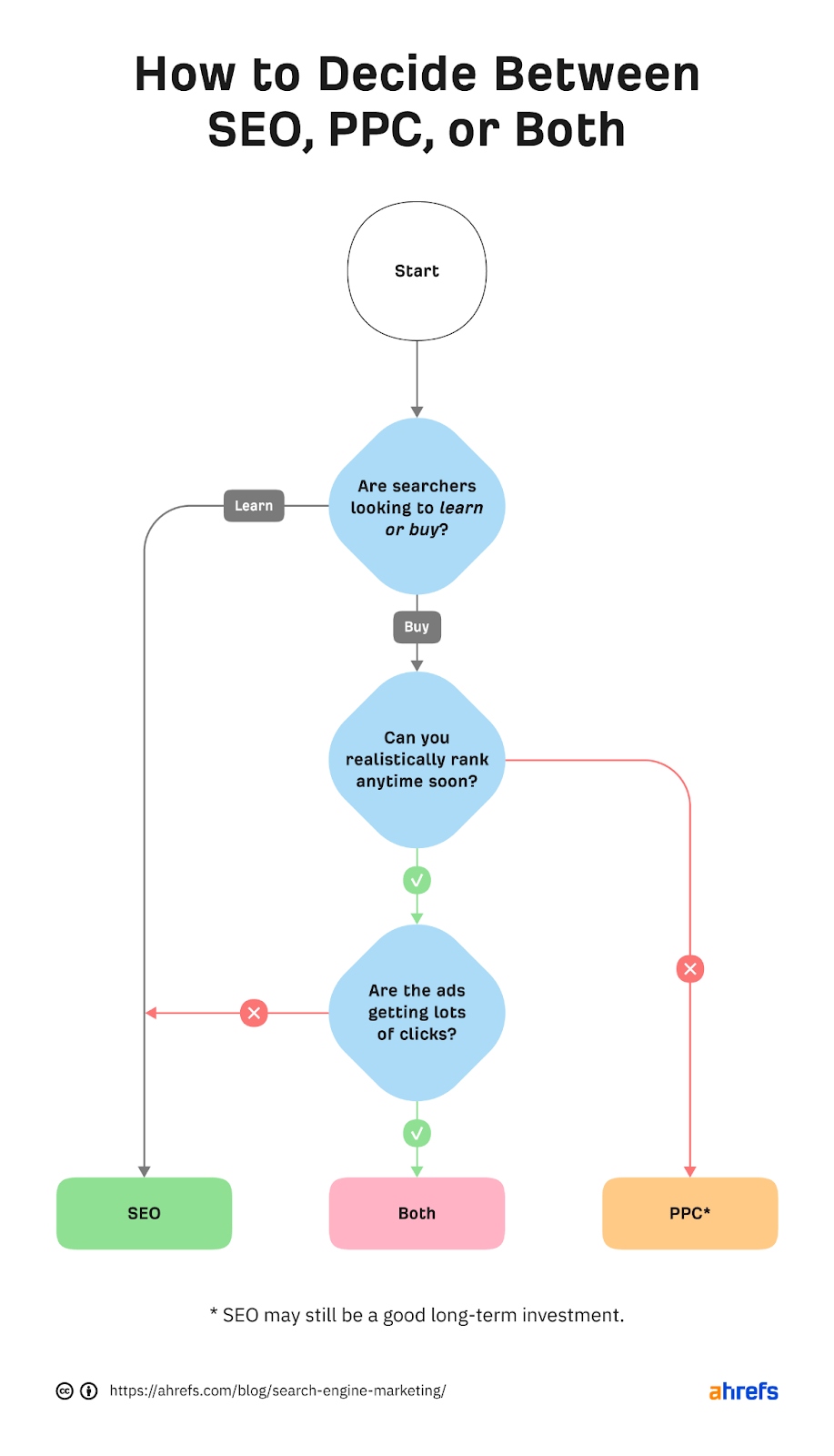
Here are the three general rules:
- SEO is best for informational keywords.
- PPC is best for “hard to rank for” keywords.
- PPC and SEO are best for ad-heavy keywords.
Let’s look at the reasons why.
SEO is the best SEM strategy for informational keywords
Keywords where people are looking to learn, not buy, are rarely good candidates for PPC.
This is because very few people will convert, so it’s hard to make a return on your investment.
For example, take the keyword “how to eat more protein.” It gets 2.1K monthly searches and has a low average CPC of $1.40.
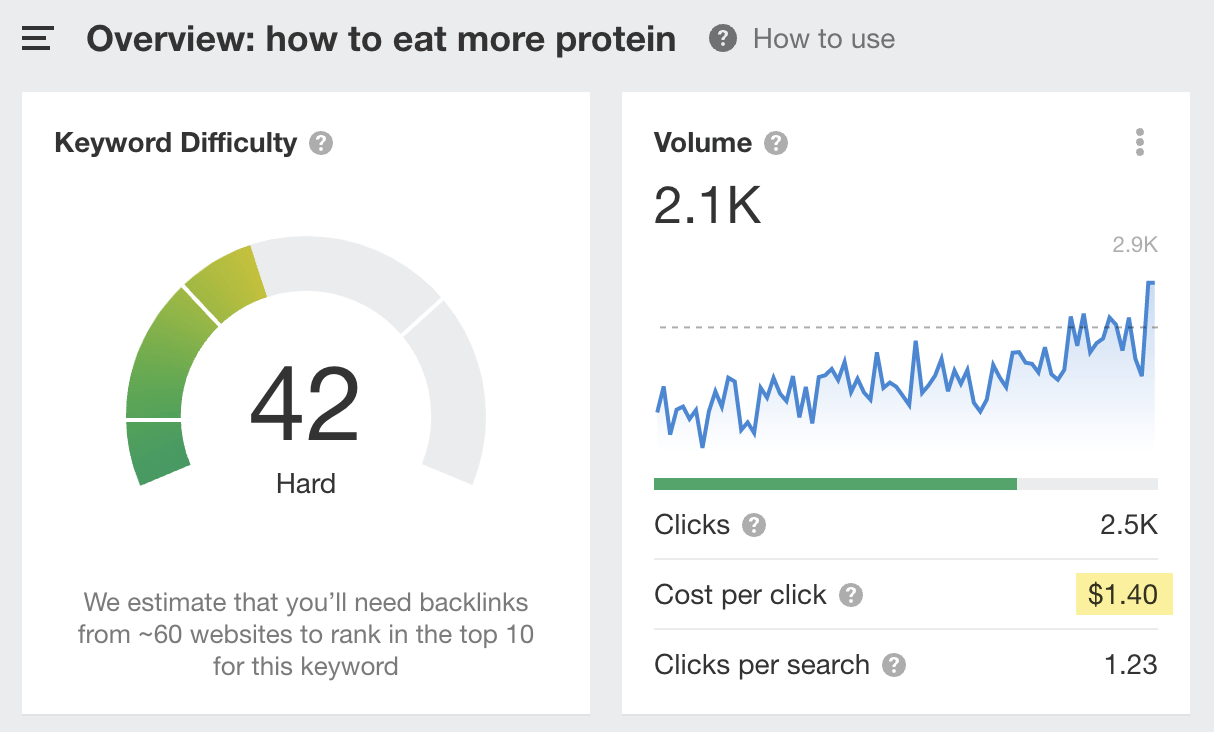
Although you could drive 100 clicks from this keyword for just $140, most of these people aren’t in the market for protein powder and are unlikely to buy. They just want to learn how to increase their protein intake.
How do we know? Look at the search results. They’re all blog posts.
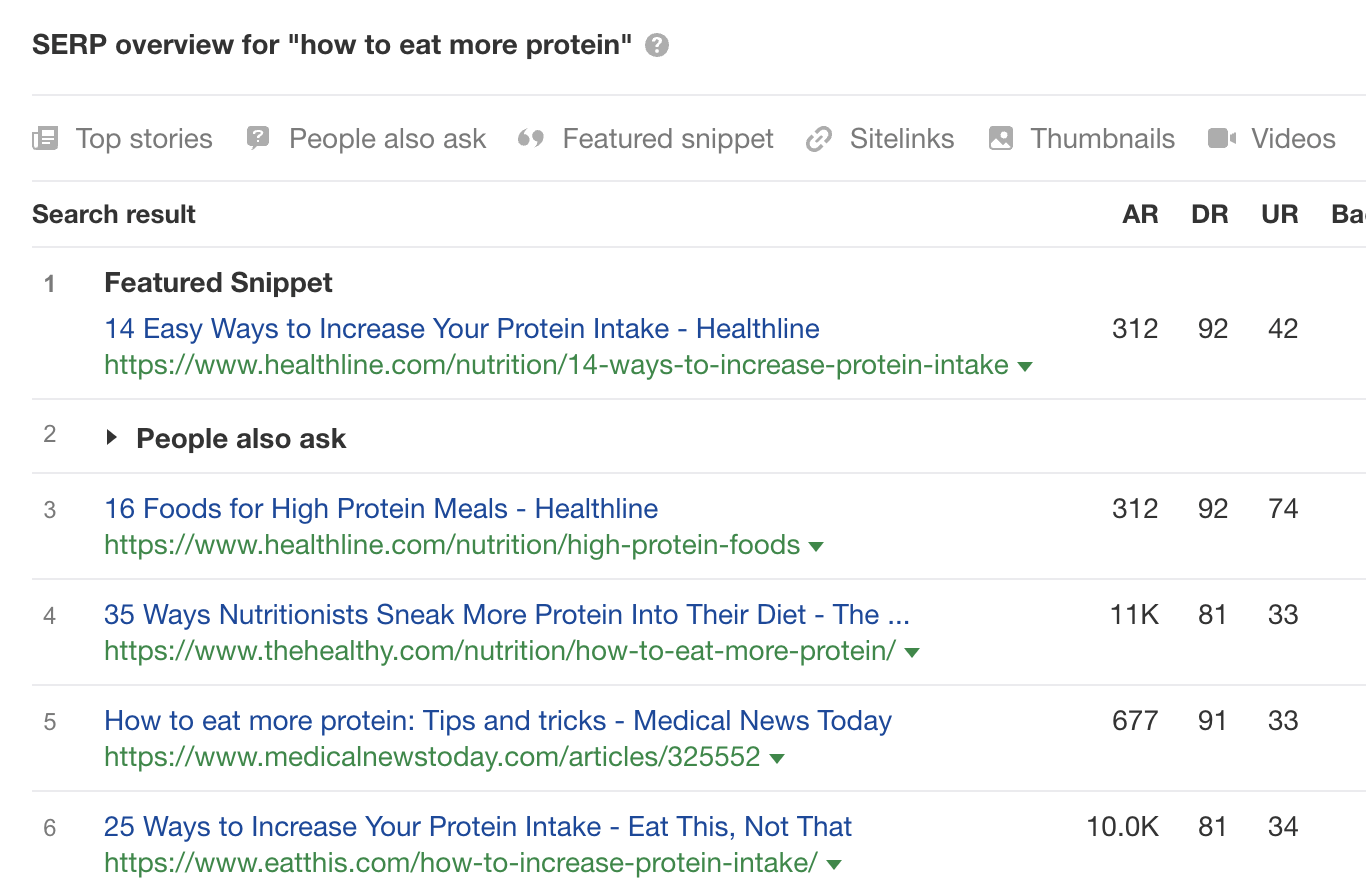
But you might be wondering: If few of these searchers are likely to convert, what’s the point in using SEO to rank organically?
The answer is simple: The numbers are more likely to work, as SEO is often cheaper.
For example, there’s a post ranking in position #9 for this keyword that gets an estimated 566 monthly organic search visits. It has just one backlink and sits on a low-authority site with a Domain Rating (DR) of 41.
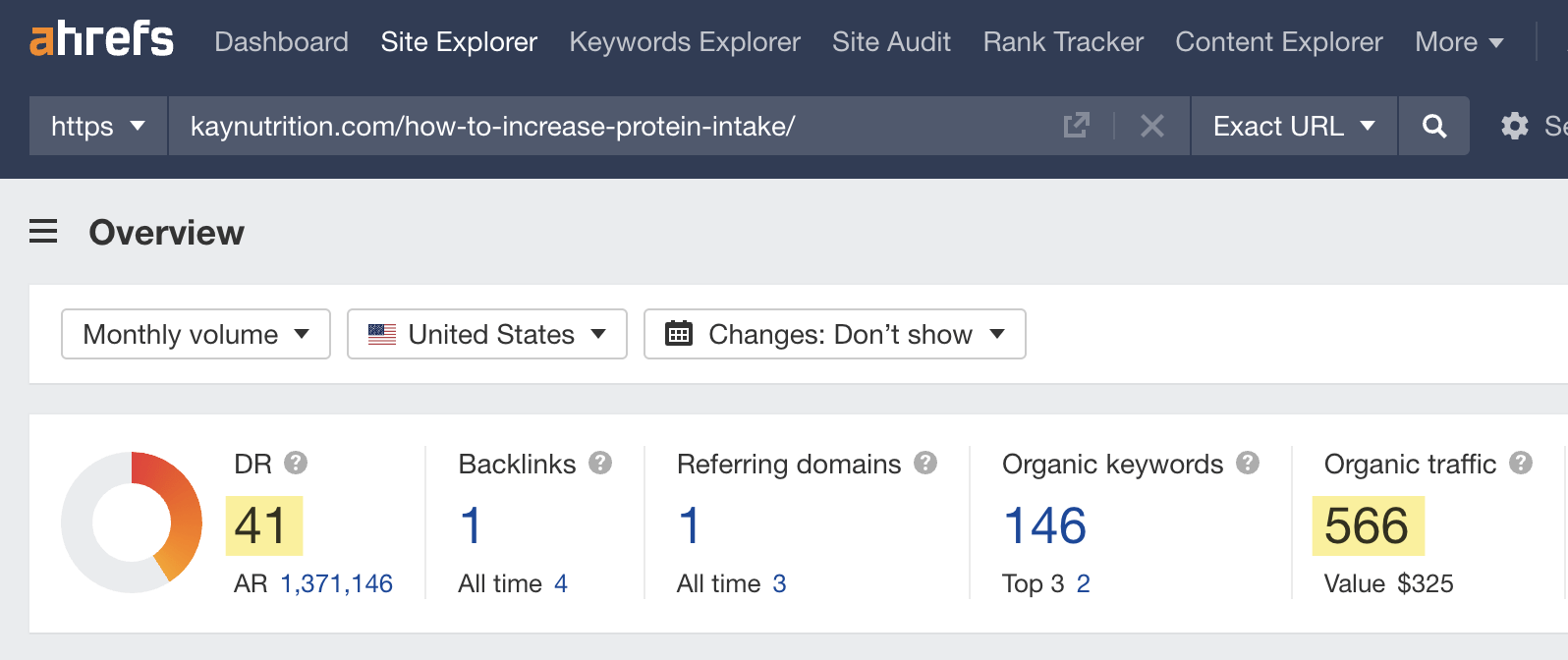
The post itself is short, basic, and probably didn’t take that long to write.
Even if just one or two of the 566 monthly organic visitors convert, creating and optimizing the post was worth the effort. The same can’t be said for paid ads, as it would cost an estimated $325 per month to drive the same traffic using PPC.
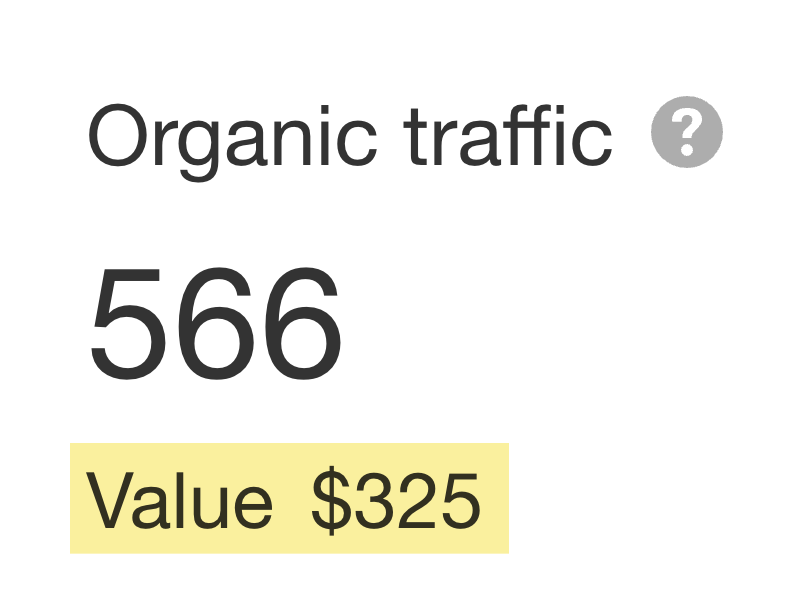
PPC is the best short-term SEM strategy for “hard to rank for” keywords
Ranking for some keywords can take years.
For example, if you want to rank for “buy protein powder” with a new supplements store, your chances of ranking in the short term are slim. This is because you’re going up against established brands like Amazon, Walmart, and GNC.
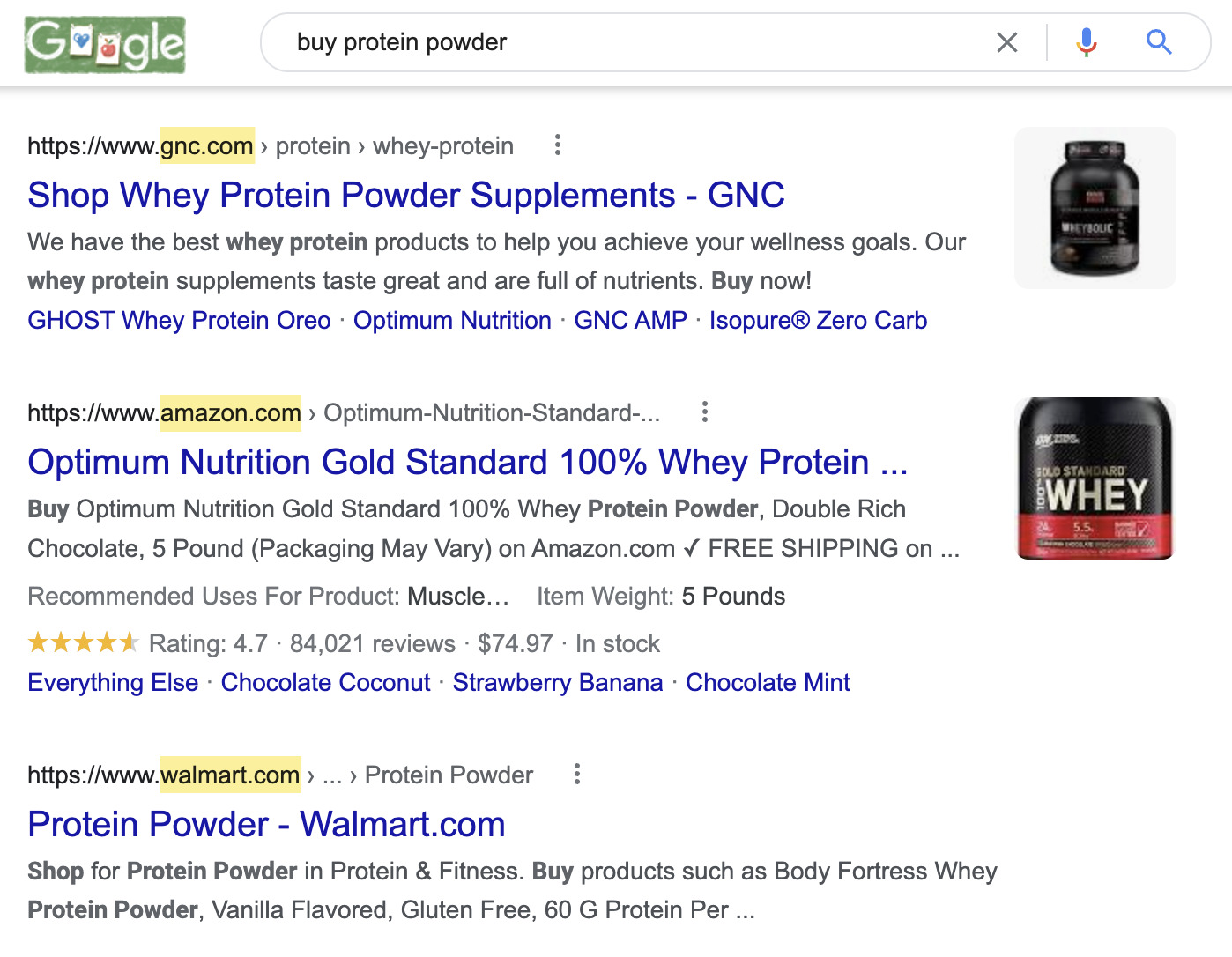
Does this mean you should abandon SEO and just run ads?
Not necessarily. But PPC is probably your best bet to drive traffic in the short term.
Here are three benefits of running ads:
- You can get traffic immediately. Paid traffic is instant. Send that traffic to a relevant page optimized for conversions and you can drive sales.
- You can test and optimize for conversions. Google Ads tells you the average cost per conversion. Use this data to run controlled tests to improve your conversion rate.
- You can get valuable keyword data. The search terms report in Google Ads shows conversion data for the keywords you’re bidding on. Use this to find high-converting keywords to target with SEO.
For example, let’s say you sell protein powder.
Bidding on relevant keywords will send instant clicks your way. Some of these will convert and others won’t. Running tests and optimizing for conversions is one way to get more juice from your campaigns, but certain keywords will likely still drive more conversions than others.
Here’s what that might look like in the search terms report in Google Ads:

In this case, more specific keywords like “low carb protein powder” and “organic protein powder” have higher conversion rates than broad keywords.
These keywords may be good candidates for SEO as part of a long-term SEM strategy.
If you’re curious which ones are likely easiest to rank for in organic search, paste them into Ahrefs’ Keywords Explorer and sort by Keyword Difficulty (KD).
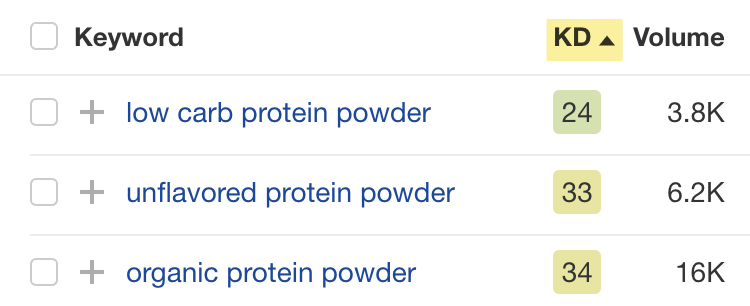
Using PPC and SEO is the best SEM strategy for ad-heavy keywords
Google shows more ads for some keywords than others.
For example, there are four ads for the keyword “car insurance.”
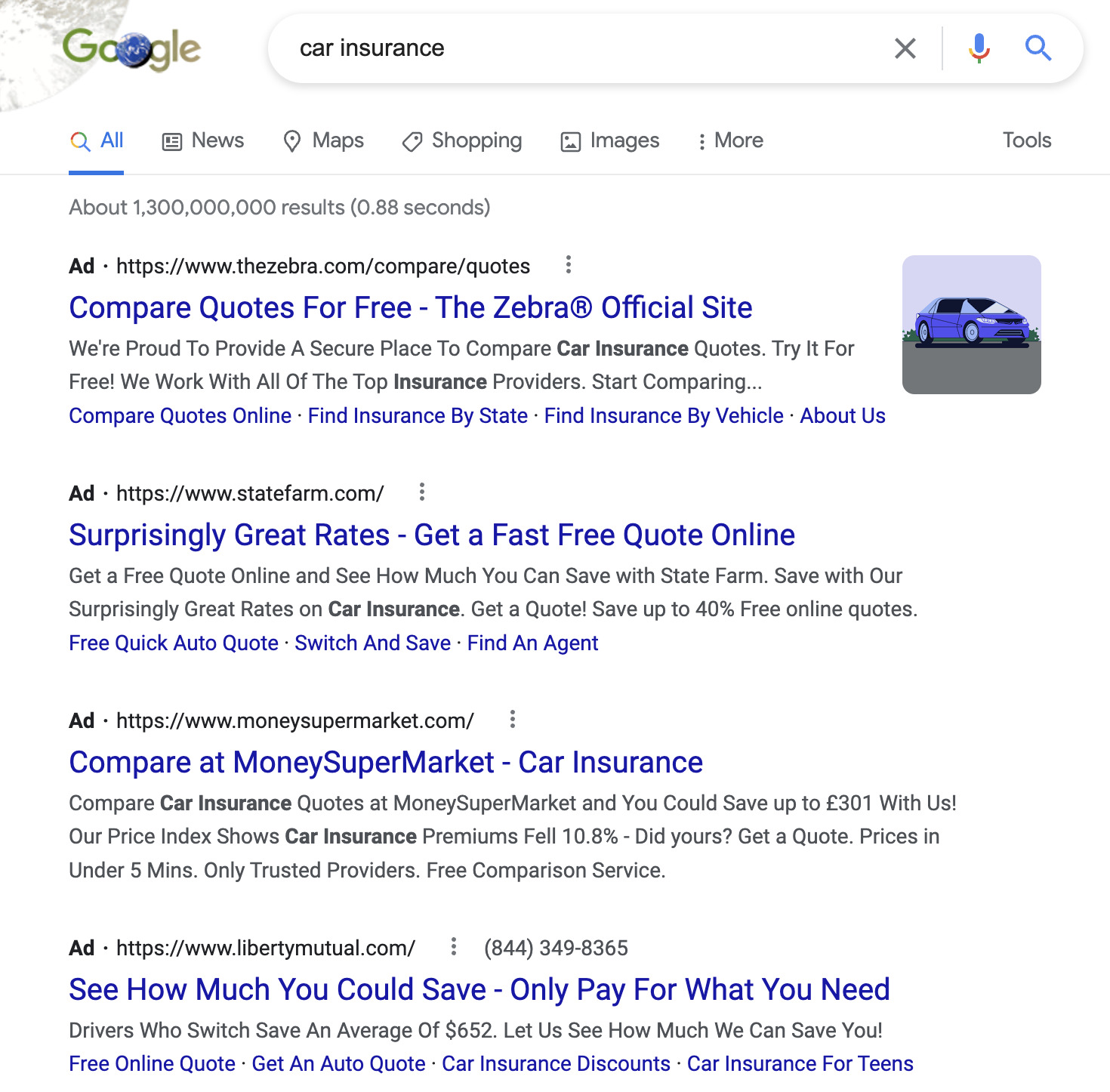
This leads to fewer clicks on organic results, as they get pushed down the page.
How many fewer clicks?
For the keyword “car insurance,” there are clicks on paid results for 23% of searches:
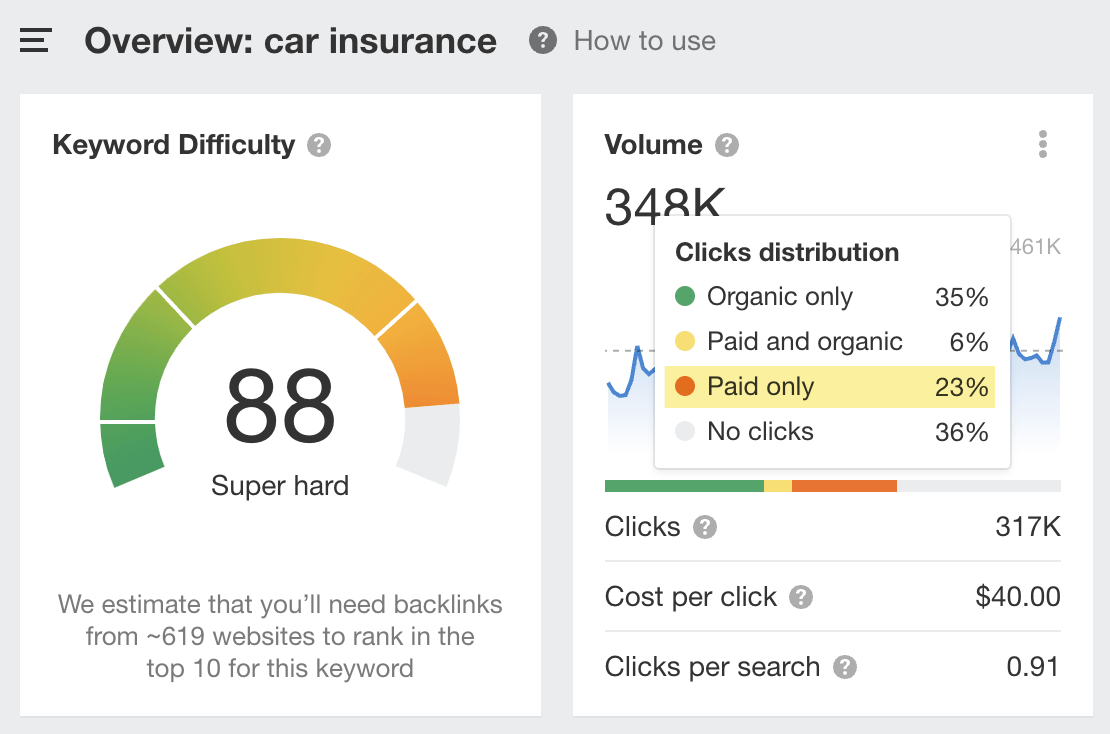
This means PPC is a great way to get traffic from this keyword, but what about SEO?
It depends on how easy it would be to rank organically.
Ranking for “car insurance” would be tough, as it has a KD score of 88. This means that you’d probably need lots of backlinks to rank, and that’s rarely a quick process.
Now let’s take a look at the keyword “short term car insurance”:
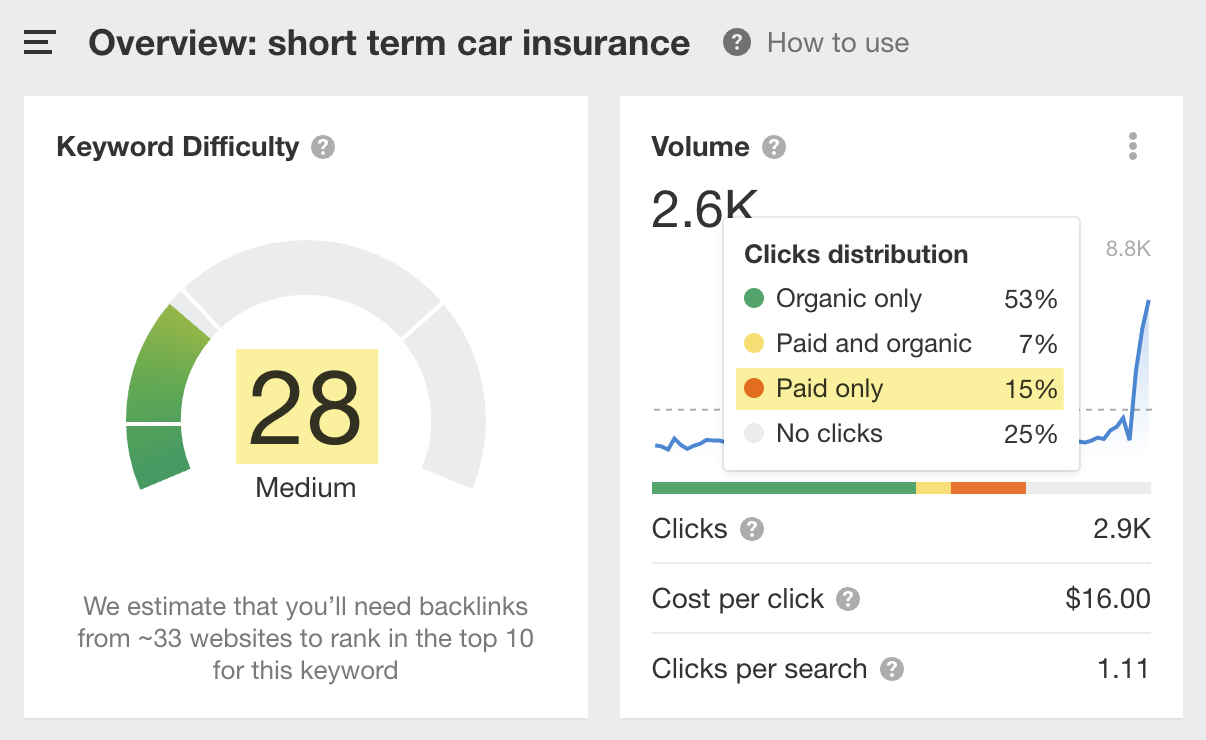
This time, the keyword has a low KD score, so it may also be a good candidate for SEO to maximize search traffic.
Keep learning
Check out these resources and video below to learn more about SEO, PPC, and SEM.
- Beginner’s Guide to SEO
- Beginner’s Guide to PPC Marketing
- Beginner’s Guide to Search Engine Marketing
- SEO vs. PPC: Differences, Pros, Cons, & Which to Choose
